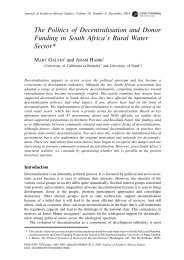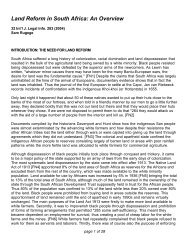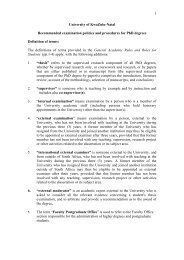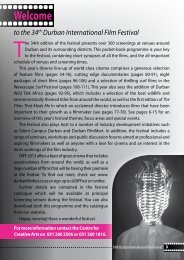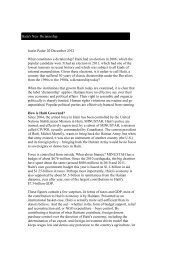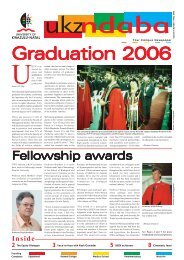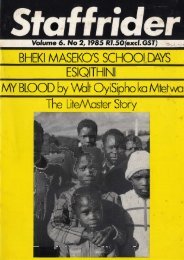Staffrider Vol.3 No.4 Dec-Jan 1980 - DISA
Staffrider Vol.3 No.4 Dec-Jan 1980 - DISA
Staffrider Vol.3 No.4 Dec-Jan 1980 - DISA
You also want an ePaper? Increase the reach of your titles
YUMPU automatically turns print PDFs into web optimized ePapers that Google loves.
Charles Rukuni64 We are up againstCharles Rukuniworks as a foreigncorrespondentand is alsoattached to ablack weeklynewspaper, Nioto— owned byMambo Press. Hisshort story 'Whostarted the War?'was published inForced Landing.Relevant theatre could not emerge and boldly be part ofcurrent culture. The situation was meant to squeeze out anyform of popular creativity.We wrote basically about social problems. There was amarked tendency among writers to shy away from politicalissues. Most of the publishing outlets were government-run.At the Literature Bureau where I am working it was unpopularto write against the government. Many of the blackwriters resorted to things like traditional life — witchcraft,broken family life, old society versus modern lifestyle. In asense, traditional writing became the norm.I published a sixty-page collection of short stories entitledComing of the Dry Season. Some of these stories I hadwritten while still at high school. The book was published in1972 and was later banned in 1974. Four years after thebanning, the censors decided to lift the ban.Every two years the Rhodesian censorship board used toreview bans on creative literature, apart from works whichcirculated as underground writings. If the reasons no longerapplied the book would be unbanned.So, in my case a big argument arose between a leadingacademic and his English Literature staff and the Censors. Hewas Irish and knew a lot about that country's protest literature.He made the point that the book was not even in thetradition of protest literature. His major point was that thereis a difference between literature and propaganda. Thoughnot articulate enough, the book did at least pinpoint wheresome of the problems lay.Among the reasons for the banning was this: a characterwitnesses a harrowing scene where somebody is knockeddown by a car. Some blacks converge and ask the eye-witnesswho's done it. Without wasting time he says, 'That boer overthere.'Because of that line, the censors thought the book wouldcause racial friction.Professor McLachlan at the Zimbabwe University andother people at the teaching colleges came out boiling againstthe censors. Funnily enough, it was two years after the bookwas published that they first noticed it. In fact someonebumped into it while doing a thesis on Zimbabwe/Rhodesialiterature since 1900. This was how they first noticed Comingof the Dry Season. The book was published by OxfordUniversity Press — their branch in Nairobi, Kenya. Casualreaders were also in the dark about it until ProfessorMcLachlan decided to set it for his first year students.*Colonial Hangovers"We are up against 'colonial' hangovers. The free flow of creativeactivity was checked when we were a subjected people.Relevant drama does not attract much interest from showlovers. It complicates matters. If, for instance, your play isdramatized at a hall next to a cinema, even if you advertise itas a free show, people will flock into the cinema. I'm notsaying that films wouldn't have a large following anyway, ofcourse. They would, even when what we had on the screenwas first censored by the Publications Board in Johannesburgand then the local censors, here. Films distributed by Ster-Kinekor arrived here 'third-hand'.The Literature Bureau under the aegis of the governmentused to keep manuscripts for, say, three years before decidinganything. Most of the writers were discouraged. TheBureau was interested only in Shona and Ndebele writings.Most of the contributors were prominent people who hadreceived their education in British countries. For them writingwas only a show and they felt obliged to pass on theiracquired knowledge. An ordinary person might have hadmore to say, but lacked the necessary expertise.Peasants in the rural areas received more political education.They endured hostilities from both the white armyand the black reactionaries. But they fought back, and cameto know their history far better than any of us here in thecities. They fought to abolish the Tribal Trust Lands. Theyhad finger-tip contact with vakomana. They came to know alot about the liberation struggle. They were better off thanblacks who went to work at 8.30 a.m., had a big lunch,knocked off at 5.00 p.m. and after that went to a pub. Thenthe same thing the following day, forever.Did Rhodesian P.E.N, help?The Rhodesian P.E.N, did not create opportunities fornew writers. Instead they acknowledged works which werealready published: be it in the country or abroad. In theirliterary contests, the judges seemed prejudiced in favour ofworks which were not banned in Zimbabwe then. They alsoseemed to me to be influenced by what was currently doingwell on the book market.Were the writers able to find a way of getting their workspublished?Not many came out. There was a problem from thefinancial aspect. I don't know what happened to an artassociation which was meant to take a constructive line onthis issue. Most people preferred to stand by without reactingwhile the national leaders were still in prison. You shouldhave seen the way university students reacted when they readabout the resurgence of writing by blacks in your owncountry.Then there was censorship, too. The result is that writerslike Dambuzo Marechera of The House of Hunger fame arenot even known in their own country. They are established'outside' rather than 'inside'. Internally, there are a few likePatrick Chakaipa who are most popular. Thompson Tshodzois well-known as a Shona playwright. Their works get airedon the radio — sponsored by business concerns like theColgate-Palmolive firm.Cultural resistance under the Rhodesian regime was in apassive phase. The trash that was put out during those days isstill with us.aSTAFFRIDER, DECEMBER <strong>1980</strong>/JANUARY 1981 19




